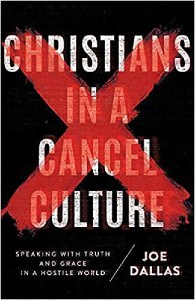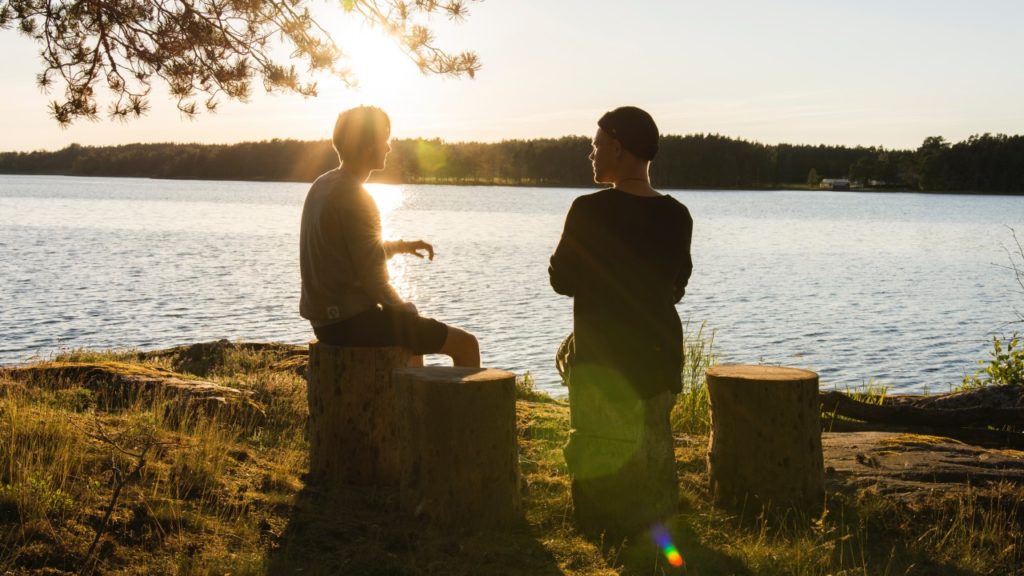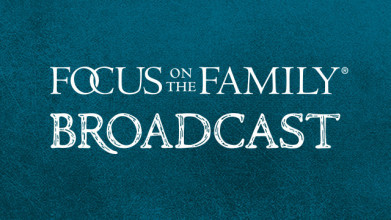Preview:
Joe Dallas: I think that we need to get back to the basics of realizing the Word of God is still living and powerful. If we will preach it faithfully, we preach evangelism to the unsaved. They need to be born again. If somebody is transgender or homosexual or whatever they are, if they have not been born again, that’s secondary.
End of Preview
John Fuller: If you’ve ever spoken up about your Christian faith, chances are someone has tried to cancel you, either online or in the workplace. Uh, our culture today can be hostile. It is hostile to Biblical values, and we need to lean on a strong spiritual foundation as we navigate some rough waters.
This is Focus on the Family with your host, Focus president and author, Jim Daly, and I’m John Fuller.
Jim Daly: John, I had a great conversation with Joe Dallas recently about cancel culture. It’s everywhere. And it’s amazing how God changed Joe’s heart after he identified as homosexual in his teens. And now, for many years, Joe has been sharing his faith and reaching others for Christ. And I think he really has a handle on how to do that with truth and grace. Uh, that’s not easy to do in this culture where people are choosing their own path apart from God, a- where anything goes. There’s a lot we can learn from Joe, and I hope you’ll stay with us for some thoughtful dialogue.
John: Joe Dallas is an author, conference speaker, and pastoral counselor. He’s the founder of Cloud Fire Ministries in Tustin, California. That’s a counseling ministry for men dealing with sexual addiction and other sexual and relational problems.
Uh, Joe has written a book called Christians in a Cancel Culture, and we have that for you at Focusonthefamily.com/broadcast. Here, now, is Jim Daly with Joe Dallas on Focus on the Family.
Jim: Uh, Joe, welcome to Focus on the Family.
Joe: Hey, thank you for having me, Jim.
Jim: (laughs) It’s so good.
Joe: Great being here.
Jim: Uh, man, I’ve watched you from afar. We haven’t had a chance to really sit down and talk before, so I’m looking forward to our discussion and, uh, kind of getting into some of the things that are going on in the culture. You know-
Joe: There’s lots to get into.
Jim: Yeah, there’s a lot to get into. And, uh, helping people better understand where you’ve come from. I think everyone probably knows what cancel culture is. Let’s start there. Uh, when you look at it, how would you define what cancel culture is all about?
Joe: Yeah, Jim, the term has kind of morphed.
Jim: Yeah.
Joe: Uh, cancel culture, a few years ago, meant more specifically the attempts to erase the history of figures that were now deemed unacceptable. If they owned a slave, for example, or if they held the wrong position on different issues, we would cancel their memory, or- or tear down their statue, or remove them from the history books.
Now, uh, the concept has broadened. So, really, y- you can lump cancel culture, the woke movement, social justice movement, all of them are part of what I call a crusade. And basically, cancel culture, then, is part of a crusade to revise our understanding of some basic concepts that- that have always, uh, bound us together; the definition of family, the definition of marriage, the definition of social justice, uh, the definition of patriotism, the definition of faith and religious freedom. These have all been basic kind of pillar concepts that we’ve always held onto.
Cancel culture has basically moved in over the past decade, especially, and said, we want to revise this, and we will revise this (chuckle) and if you will not go along with the revision, then you are one of the infidels. Uh, every crusade has infidels, right? I mean, the crusade sees-
Jim: The good guys and the bad guys.
Joe: You got it.
Jim: Yeah.
Joe: We’re the bad guys. I mean, I don’t care how nice we are. I don’t care how reasonable we are, how loving we are. If we hold to Biblically-based values, if we hold to a Biblically-based worldview, cancel culture, as a movement, will not accept us as anything but infidels.
Now, I- I don’t wanna make everybody involved in it out to be some lethal enemy, because every movement is made up of individuals, just like- you know, you got the Pharisees. They were obviously hostile to Jesus. But, you know, then you got a Nicodemus. Yo- you get reasonable people, and you have reasonable people in any movement.
Jim: Sure.
Joe: But the movement itself, uh, basically views anyone holding to traditional viewpoints as needing to be converted, and if they will not be converted, they need to be silenced.
Jim: I-
Joe: So, that’s- that’s my long answer.
Jim: Yeah, no, no, that’s really good. And cancel culture, to me, when you look at it, always tilts to the progressive left. I mean-
Joe: Oh, sure.
Jim: … it’s not a cancel culture toward the right in any way, to those, uh, traditional positions. I think one of the difficulties we have, Joe, um, being more conservative, is it’s even hard to have a dialogue with these people-
Joe: Oh, yeah.
Jim: … because there’s no definition of anything, and y- you know, what you talked about a moment ago, those traditional values of family, nuclear family. I mean, it always drives me nuts when they say nuclear family is a western-European construct, and you’re going, well, Jesus talked about it.
Joe: Mm-hmm.
Jim: He said, “A man shall leave his mother and father-
Joe: Right.
Jim: … and cling to his wife, and the two shall become one flesh.” So, it- it’s kind of interesting that they lay that at the feet of western-European enlightenment.
Joe: I think that somehow makes it looks more like it’s a human construct. There’s no divine authority attached to it. It’s just cultural and as such, it needs to be revised to move ahead with the times. You know?
Jim: Yeah, and again, it just always tilts to the left, and we’re gonna weave in and out of all these themes. So, I’m coming back to some of the things you’re talking about, but I wanna get a little laser focused on the LGBT-
Joe: Mm-hmm.
Jim: … movement, and-
Joe: Yeah.
Jim: … if you look at that, um, effort, you know, they gained some incredible ground in this culture.
Joe: Hmm.
Jim: You know, one of the things I- I try to make contact with people in that community, and I- you know, thankfully, I have been able to develop some friendships, and, you know-
Joe: Yeah.
Jim: … before people say, “Wow, you know, how can you do that?” Hey, I believe the Lord does call you to do that. The key is don’t give up your Biblical positions-
Joe: Right.
Jim: … in that relationship, but, you know, it’s important to develop relationships-
Joe: Mm-hmm.
Jim: … with people who think differently. I don’t- I’m not afraid of that.
Joe: Sure.
Jim: I think the Gospel will do its work, regardless. But in that construct, the- the thing that I’ve found is, uh, the gains, again, that they’ve made. I mean, they were able to make those gains in a democracy. They got to the table of power, you might say, and I think one of the biggest challenges they have is how do they change from being a more militant group into a pluralistic element-
Joe: Mm-hmm.
Jim: … within a culture that believes a lot of different things. You know, Christians have a place at the table. I think it’s fair to say they built the table.
Joe: Mm-hmm.
Jim: You know, Judeo-Christian values in this country. And- and in that construct, you know, how do we recognize where- where the LGBTQ community has come from and where they’re at today?
Joe: Mm-hmm. Yeah, well, you know, I was part of that.
Jim: Right.
Joe: I mean, I, uh, from 1978 to 1984, I was a very committed member of the gay community, uh, and for years served on the staff of a pro-gay church, and very actively promoted the idea that homosexuality and the Bible were compatible. And then, my last few years when I was with the gay community, I’d become mu- much more of an activist. So, I’ve been on that side of the issue.
Now, I won’t legitimize a- any of what I stood for when I was a part of that, but I will tell you this, Jim. It was a more reasonable movement at that time.
Jim: Not as militant.
Joe: I- I have to say- Oh, I look at it now, I don’t even recognize this.
Jim: Yeah.
Joe: I mean, in my day, which was a long time ago, admittedly, but in- in my time, I don’t know anyone who wanted to impose an ideology on churches. I- I didn’t know anyone who wanted to silence the church or silence conservatives, for that matter. Uh, what we were fighting for at the time was decent treatment. Please don’t beat us up. Don’t call us ridiculous names. Don’t outlaw us. You know? Let us at least be able to live in peace. Now, there may have been some in the leadership at that time, late 70s, early 80s, who had something a little more sinister in mind, and thought, well, we’ll get our foot in the door, and then once we’re in, we’ll take over, but I sure didn’t see that. I mean, at-
Jim: Yeah.
Joe: … at the time I was a part of it, I think most of the things we were asking for were at least reasonable. I was wrong. We were wrong in- in a lot of areas. But the movement did not have the same complexion it has today. What it’s become now is basically a demand for the normalization of homosexuality and transgender, and, um, uh-
Jim: And normalization includes acceptance-
Joe: Oh, yeah.
Jim: … by all.
Joe: Yeah. The- this is not tolerance-
Jim: Yeah.
Joe: … we’re talking about. This- this is basically approval. I mean, there was a time- gee, I even remember a few years ago, d- you remember all those nice bumper stickers that said Coexist and you had-
Jim: Right. (laughs)
Joe: … all the different religious- Yeah, well, f-
Jim: Would that be nice.
Joe: … forget about that, brother. (laughs) I mean, well, that’s all- that- that train’s gone.
Jim: But, you know, in that regard, it’s interesting to me that great old saying, you know, that “Power corrupts and absolute power corrupts absolutely,”-
Joe: Yeah.
Jim: … and I think whether it’s in the hands of the church or in-
Joe: Mm-hmm.
Jim: … the hands of people that don’t believe in God, like the cancel culture-
Joe: Mm-hmm.
Jim: … LBGT leadership, when people get power as a movement, they usually wield it, um, in very negative and even evil ways.
Joe: Mm-hmm-
Jim: And I- again, I’d put even the church, you know, slavery isn’t evil. It’s a scourge.
Joe: Sure.
Jim: People did not catch up to that quickly enough, and- and America didn’t make its correction, uh, as soon as it could have. Now, I do give the founding fathers great credit for creating a document that gave a 90-year off-ramp to slavery.
Joe: Right.
Jim: They just needed Abe Lincoln and the, you know, the American psyche to kind of move, and so, it did provide a way for everyone to be seen as equal and created in the eyes of God. Right?
Joe: Right.
Jim: Um, let me take you back, uh, to your story, ’cause I think people need to hear that.
Joe: Mm-hmm.
Jim: You- you’ve referred to it being part of the LGBTQ community. Um, let’s talk about that.
Joe: Yeah.
Jim: Where were you at? What was going on in your life? What- what do you think in that self-analysis kind of moved you in that direction?
Joe: Mm-hmm.
Jim: And let’s talk about both the pain and then the aspiration of coming out.
Joe: Yeah, Jim, I- I think, um, the term “accidental activism” would apply (laughs) real well to my life, because, uh, I never intended to be actively defending principles that I’d been utilizing just to serve people. But I think the trajectory of my life took me in that direction. Uh, I became a Christian at age 16, 1971, I’m 67 now. And, uh, by that time, I had already begun identifying myself as gay, which in 1971, that could get you killed.
Jim: Right.
Joe: Really. Um, but, uh, I had had a number of relationships with adult men, and I had known for years that I was attracted to the same sex.
Jim: Can I- let me- let me pull this out.
Joe: Yeah.
Jim: Um, in that regard, where did- where did that sexual confusion- and people are gonna erupt on that, the fact that I’m using that term-
Joe: Mm-hmm.
Jim: … but where did that sexual confusion start for you as you’ve had plenty of time and you’re on all sides of this-
Joe: Sure.
Jim: … debate. When you do yourself analysis, what do you think led you in that direction?
Joe: I know a part of it was in my upbringing. I felt, from early on, and I don’t know who’s to bless or who’s to blame (laughs) for this, so I’m not pointing fingers.
Jim: Yeah.
Joe: I will only say that from the time I was conscious of who I was, I was also conscious of my awkwardness. I felt unwanted. I felt that I was viewed as being stupid, as being-
Jim: Yeah.
Joe: … in the way. Just not- not of much value. And, uh, that set me up for, um, a horrible encounter when I was eight years old with an adult man in the theater, uh, in the downtown area of my city, where I was raised in California. Um, he approached me when I was waiting to watch a movie. I was alone. I was- I spent a lot of my time (chuckle) alone. I was in the lobby. He, uh, chatted me up. He was very friendly, and the idea that an adult man, a father figure, if you will, found me interesting and liked me-
Jim: Huh.
Joe: … and wanted to hear what I had to say. Jim, I’d have followed him off a cliff.
Jim: Right.
Joe: I just drank that in. So, he asked me if I needed to use the restroom and, um, he followed me into the men’s room and then waited till everyone was gone and grabbed me and sexually molested me.
Now, what was a turning point about that was not just the pain and- and the bewilderment of it, ’cause I didn’t even know what sex was. I sure didn’t know what-
Jim: Right.
Joe: … molestation was, but it was the lie. Uh, this is something I feel strongly. Anytime you have either physical abuse of a child or sexual abuse of a child, you’re gonna get confusion. It’s- it’s like this evil catechism. You know, catechism is very didactic. This is what life is. This is what you are. This is your purpose.
Well, that’s what molestation teaches a kid. This is what love is. This is what your body is for. You have no boundaries. This is all you’re good for. Go along with it. And that lodged deeply in that little eight-year-old boy’s soul. I know it did. And that set me up in a couple of ways. It left me with a deep conviction that I was not like other boys or else this never would have happened to me.
Jim: Wow.
Joe: Kids, when they’re victims, they tend to blame themselves.
Jim: Absolutely.
Joe: They gotta figure, it’s not the adult’s fault. It’s gotta be me. Oh, well, I’ll give them- there’s something obviously terrible about me that this man would’ve felt free to do this to me. And that kept me away from peer relationships. It made me very insecure. It left me feeling that I could not relate to boys and men the way boys and men normally relate. I was there to be sexualized. In fact-
Jim: Right. Worse than your isolation.
Joe: Oh, absolutely! It- it set me up for years and years of living in a fantasy world where I would steal pornography from a liquor store and go off by myself and just view it and get lost in the imagery. So, I was ripe for sexual confusion.
Jim: You- you, uh, ended up going out with a girl-
Joe: Mm-hmm.
Jim: … I think in high school, and that was kinda the spiritual element of that, that she-
Joe: That was us. (laughs)
Jim: Yeah. I mean, think of this-
Joe: You know what’s so funny about that.
Jim: Yeah.
Joe: I still dated girls and I was still interested in girls. But this- this one, in particular, uh, she asked me to a dance. It was a backwards dance, the- the- the girls ask-
Jim: Right.
Joe: … the guys.
Jim: The girl- yeah.
Joe: She was a Christian. I kissed her goodnight, said, “I’d love to see you again.” She said, “I’d like to take you to church.” I couldn’t believe that. Church?
Jim: Right.
Joe: But she did. Um, that Sunday, we went to Calvary Chapel Costa Mesa. This was at the height of the Jesus movement.
Jim: Chuck Smith.
Joe: Chuck Smith, and the place is bursting at the seams.
Jim: Yeah.
Joe: All these hippies that just got saved.
Jim: Right.
Joe: That’s when I first heard the Gospel, and when I heard the Gospel, what- what confronted me was my own, um, stubborn hanging on to something that I knew I was gonna have to relinquish. And finally, God won that battle. So, that was all well and good, but here’s the problem. When I was born again, Jim, 1971, nobody was doing what you and I are doing.
Jim: Right.
Joe: Nobody was talking openly about this stuff from a Biblical perspective.
Jim: Yeah.
Joe: Few people were even talking about it at all, but certainly not within the church. And because of that, I thought, okay, I’ve repented the sin, got that. Cleaned my act up, got that. I’m in Bible studies every night and my prayer life is thriving and I’m- I’m doing all the right things, and I really was thriving spiritually. But I still had homosexual temptations.
Jim: Sure.
Joe: And I thought “Something’s wrong here.”
Jim: Yeah.
Joe: I’m supposed to be a new creature. Everything’s supposed to be new. I should be relieved of this. No true Christian could ever feel the desires I am still feeling. There must be something wrong with me, but I was scared to death to tell anybody. And this is something I harp on with my clients that I’m working with, is, for heaven’s sake, don’t ever think you can do this alone. If you’ve got a deeply ingrained sexual sin, pornography, homosexuality, whatever the thing is, if you don’t bring it out into the light, forget about doing it in isolation. That’s not going to happen. But I tried to do it in isolation. I prayed harder. I fasted. I did all the right things. The temptations were still there. I did not understand the fact that, you know, we’ve got an ongoing struggle between the flesh and the spirit.
Jim: Right.
Joe: Now, around that time, the gay rights movement was starting to gain visibility and I started thinking, “Why am I doing this? Why am I saying no to something that is so deeply ingrained?” If God didn’t take it away from me, uh, you know, I’m just spitting in the wind and I am tired of this, and I think I’m gonna give myself permission to say yes to it. So, at age 23, I left the church. I said, “I’m out.”
Jim: This is who I am. Your identity was-
Joe: “I’m gay.”
Jim: … in the other.
Joe: And you know what? It was pretty exhilarating. I mean, I understand it, National Coming Out Day, why so many people are saying, “Oh, I never felt so free.” I get it. I get it, because you stop keeping a secret, and you feel like you now have something solid you can cling to by way of community, built-in relationships, even celebration. You’re seen as heroic for making that declaration. And for a while, there’s a real high that goes with it.
But I missed my fellowship with the church. I missed my relationship with God. But I wasn’t really willing to submit my sexuality to God. That’s when I heard about the gay church. And that’s when I visited a pro-gay church. And that’s when I realized there were not only plenty of people who were gay like me, there were people who were Christians who identified as gay.
Jim: Mm-hmm.
Joe: And this, to me, is an important point, Jim. Every person I met in the gay church had belonged to another church. Been born again in another church. And had wrestled silently in that other church. And I’m talking people who had been Southern Baptist, Calvary Chapel, Four Square, Assembly of God, Episcopal, Catholic, you name it. They had come to Christ in those other churches, left those churches to embrace their sexuality. Missed their spiritual relationship with God. Thought they find the answer in the pro-gay church, which basically said you can be gay and Christian. We’ve got a better understanding of the Bible now. It does not condemn that. It does not call it a sin. And here’s how you can embrace that belief. And to a lot of us, that looked like an answer to prayer.
Jim: Yeah. Uh, Joe, I wanna tread into some deep waters here, because I think it’s important to have this discussion. I remember- I wrote a book called ReFocus–
Joe: Mm-hmm.
Jim: … and, uh, a local bookstore owner, who leans liberal, uh, asked me to come and do a- a author talk and a signing. I thought, yeah, I’ll do it, and I went down. There’s probably 50, 60 people there, right here in Colorado Springs. And there was a gay activist there. I remember at the end of my talk, uh, which really just meant how do we stay true to the principles-
Joe: Mm-hmm.
Jim: … but love a- a world that is hurting. That’s the general-
Joe: Sure.
Jim: … principle of what I talked about. And he put his hand up and he said, “You know, when are you Christians gonna get out of the archaic sexual, um, arena that you have lived in for thousands of years and kinda get caught up to the 21st century?” And, you know, he had that little smirk on his face-
Joe: Yeah.
Jim: … and I got it. And I’m standing there smiling, actually.
Joe: Yeah.
Jim: And, uh, I said, “You know what? It’s very kind of you to want to make me the, uh, editor of the book-
Joe: (laughs)
Jim: … um, but not only am I not the editor, I’m not the author, and I’m trying to, you know, contort my life to the Scripture, which is what I think God calls me to do. I don’t contort Scripture to my life-
Joe: Right.
Jim: … and my wishes and my desires,” and I even said, you know, I said, “Hey, when it says, uh, when you look at a woman, have lust in your heart.” I’d like to erase that-
Joe: Right.
Jim: … ’cause that happens.
Joe: Right.
Jim: It happens if men are honest about it, and, you know, but- but we don’t have the luxury. That is not what God calls us to do.
Joe: Mm-hmm.
Jim: It’s not us bending Him to our will.
Joe: Right.
Jim: It’s our will bending-
Joe: Right.
Jim: … to His.
Joe: Right.
Jim: And I- I think the- the deep waters of that is the acceptance of LGBT, um, ideology in the church right now. More and more churches are opening that up. They’re being accommodating, and it’s dangerous.
Joe: It’s grave danger. It’s grave danger. I- my- look. There are some things we can agree to disagree on, right? I mean, there are some doctrinal issues that, you know, the rapture of the church pre-trib, mid-trib-
Jim: Right.
Joe: … post-trib. I- I’m not gonna break fellowship over that. Can you drink alcohol or can you not? I mean, the- these are secondary issues. But when you see sexual condu- uh, sin condemned, named and condemned specifically in virtually every book of the New Testament, that tells me right off the bat, if something is a sexual sin, that’s serious. If homosexuality is listed as a sexual sin, among many others, not more than others, not less than others, but among many others, as it is in both testaments, then that tells me homosexual behavior constitutes sexual sin. Sexual sin is a primary moral doctrinal issue. So, no, there’s no room to just say we agree to disagree within the church.
And the culture, we gotta go along with Paul. He told the Corinthian church, “It’s not my job to sit here and judge those who are on the outside.” Okay? And he said, “If you wanna quit hanging around with fornicators, you’re gonna have to leave the planet.” But within the church, you have to recognize we answer to a different authority. And just like you were saying, God has spoken. Got has spoken in and through a document that’s divinely inspired so that we don’t have to sit around and guess what His will is. Now, what I realized when I repented in 1984, was along the lines of what you were saying, Jim. I wasn’t reading the Bible.
Jim: Hmm.
Joe: I was reading into the Bible.
Jim: That’s good.
Joe: I knew what I wanted it to say, and you- you know how it is.
Jim: Oh, totally.
Joe: If you choke the Bible hard enough, you can make it say anything you want it to say. It’s kinda like what people are doing with the Constitution, when people say it’s- it’s a living, breathing document-
Jim: Right.
Joe: … that’s always morphing, and whatever that tells me, okay, so, whatever you want it to say, you can impose that meaning onto it. And I think that’s what I did. And I know that’s what I did.
Jim: Yeah, and I think, again, for the person just joining us, your testimony, which is terrific, I mean, it is authentic because you were in that space. You were leaning into the ideology of the LGBT community. And then God started working on your heart, albeit it took years-
Joe: Yeah.
Jim: … to do that work. But, you know, that’s what God does. So often, um, I think, Joe, sinners feel like- and by the way, we’re all sinners-
Joe: Yeah.
Jim: … but when we don’t know the Lord, you- you can get the impression that you have to clean your life up so that it’s acceptable to God.
Joe: Mm-hmm.
Jim: That’s not the transaction.
Joe: Good luck with that.
Jim: Yeah. God’s gonna take you right where you’re at. And that actually is great comfort to the person who realizes I’m inadequate-
Joe: Mm-hmm.
Jim: … when it- I’m in my own strength. I wanna make sure we make that point, that you don’t have to clean your life up-
Joe: Yeah.
Jim: … to be good enough for God. God’s gonna take you where you’re at and start the great work of renewing your heart. And sometimes, it can be instantaneous, like alcoholics I’ve met that stopped drinking right then.
Joe: Yeah.
Jim: And others, it takes months, maybe years to do the cleaning of the heart.
Joe: That’s a good point, because- th- and this applies across the board, Jim.
Jim: Yes.
Joe: In the kind of work I do, the change question is always the big controversial question. Can homosexual people really change? And my take on it is similar to what you were just saying. The call is the same for everyone. The outcome is individual.
Jim: Hmm.
Joe: So, just for example, um, the end of John’s Gospel. Jesus is talking to Peter, and He tells him, “You’re gonna be led where you don’t wanna go.” Peter points at John and says, “Well, what about him?”
Jim: (laughs)
Joe: And Jesus says, “You know what, that’s really none of your business.”
Jim: (laughs) Right.
Joe: “You follow Me. He’ll follow Me. The outcomes will be different.”
Jim: Yeah.
Joe: Now, I repented of homosexuality in 1984. I found that within even a year, the strength of the attractions had hugely changed to the point that I met and fell very deeply in love with a woman who I’ve been married to 35 years now.
Jim: Hmm.
Joe: Now, I know other people who repented and after three, four decades, they still are essentially attracted to the same sex. They have no attraction to the opposite sex. Their outcome was different. They and I were both called to follow Jesus. The outcome may be different.
Now, does that mean they did something wrong, I did something right? No. No. I mean, they’re living Godly lives and they’re living healthy lives. They have temptations that I don’t have, but I got plenty of temptations they don’t have. So, this whole idea of narrowing it down to determining success by the absence of temptation, that’s not a very Biblical concept. We’re all called to take up our cross, deny ourselves, and follow Him. Some of us may experience this- this remarkable transformation in some area. Some of us will continue to steward our area of temptation-
Jim: Hmm.
Joe: … and, um, and- and then- and everything in between. You know? But I guess the point is, we have to recognize that all of us are called to be obedient, taking up the cross, following Him, living the disciple’s life. Leave the outcome in God’s hands.
Jim: Yeah.
Joe: And I think that the church’s position has got to be one of simplicity.
Jim: Yeah.
Joe: Simplicity meaning this. Jim, I think we try to get too fancy and figure out, okay, let’s- let’s start really doing extensive research to see how we can better communicate and finesse all of the things we need to do. Now, good grief. If the early church had thought that way, the Gospel would have never gotten past Samaria. You know?
Jim: Right. Right.
Joe: I mean, I think that we need to get back to the basics of realizing the Word of God is still living and powerful. If we will preach it faithfully, we preach evangelism to the unsaved, they need to be born again. If somebody’s transgender or homosexual or whatever they are, if they have not been born again, that’s secondary. You know, Jesus talking to the Samaritan woman. She was in sexual sin. He wasn’t so into telling her she was in sin. He recognized it, and He by no means validated it, but He said, “Let’s keep the main thing the main thing-
Jim: Yeah.
Joe: … I want you to know Me. I want you to live.” Right?
Jim: ‘Cause that’s where it starts.
Joe: That’s the point.
Jim: Yeah.
Joe: I mean, shoot, if I hadn’t been born again, why would I have ever questioned my sexuality?
Jim: Correct.
Joe: Why would I even care?
Jim: And that’s where most of these people are living. I mean, they-
Joe: That’s my point.
Jim: Yeah.
Joe: So, to them, we preach the Gospel.
Jim: Yeah.
Joe: Within the church, we disciple. To the world, we speak prophetically-
Jim: Yeah.
Joe: … and I think that what we’re gonna have to abandon is the idea that if the world is telling us we’re hateful, we should believe our own bad press. Yes, let’s not be jerks about it. We- you mentioned the pride, and I think that’s- that’s what’s tripped us up from the beginning. Let’s always be humble enough to examine ourselves, examine the way we are presenting truth, examine the way we relate to people. Let’s be aware of who we are-
Jim: Yeah.
Joe: We’ve been forgiven much.
John: That’s Joe Dallas on Focus on the Family, and we’ll have to end right there with part one of the conversation. And Jim, I so appreciated Joe’s testimony and his vulnerability. There’s something, uh, for all of us to learn from him.
Jim: Yeah, John, including that reminder that we’ve been forgiven much. We need to remember how much we needed a Savior, all of us, uh, no matter who we are. We were all lost in sin. The Bible says, “All have sinned and fallen short of the glory of God.” So, we need to realize our own weaknesses and failures and take a humble approach as we reach others for Christ and share His love, which is the good news.
Uh, Joe will have more to say next time about how we should respond in a Godly way to those in the culture who have a different, uh, perspective. In the meantime, be sure to get his book, Christians in a Cancel Culture. Talk about a timely resource.
John: Mm-hmm.
Jim: Uh, for a gift of any amount, we’ll be happy to send it along to you as our way of saying thank you for being part of the ministry.
John: Join the support team. Help us reach families and individuals around the world. Uh, give us a call and donate as you can. 800-232-6459, 800-the letter A, and the word FAMILY, or donate and request your copy of Joe’s book, Christians in a Cancel Culture, at Focusonthefamily.com/broadcast.
On behalf of Jim Daly and the rest of the team here, thanks for listening today to Focus on the Family. I’m John Fuller inviting you back, as we once more help you and your family thrive in Christ.


























